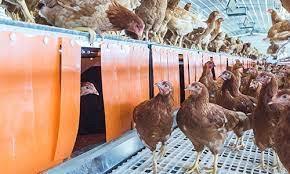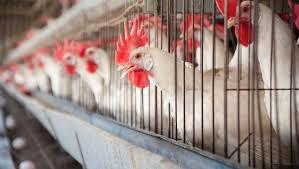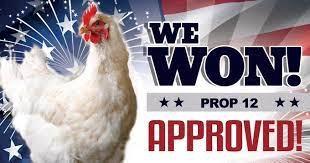 On March 28th, the Supreme Court of the United States (SCOTUS) granted a writ of certiorari and will accordingly review the decision of the U.S. Court of Appeals for the 9th Circuit in re National Pork Producers Council v. Karen Ross, the Secretary of the California Department of Food and Agriculture. At issue is the constitutionality of California Proposition #12. This ballot initiative passed with 63 percent of those voting in November 2018 and was upheld by the 9th Circuit. The Proposition strengthened and resolved vague wording in the 2008 California Proposition #2 by specifically mandating space requirements for livestock species, including 24 square foot per confined sow, effectively eliminating the use of gestation crates used by producers for 75 percent of pork production.
On March 28th, the Supreme Court of the United States (SCOTUS) granted a writ of certiorari and will accordingly review the decision of the U.S. Court of Appeals for the 9th Circuit in re National Pork Producers Council v. Karen Ross, the Secretary of the California Department of Food and Agriculture. At issue is the constitutionality of California Proposition #12. This ballot initiative passed with 63 percent of those voting in November 2018 and was upheld by the 9th Circuit. The Proposition strengthened and resolved vague wording in the 2008 California Proposition #2 by specifically mandating space requirements for livestock species, including 24 square foot per confined sow, effectively eliminating the use of gestation crates used by producers for 75 percent of pork production.
SCOTUS will determine whether California has the right to mandate production practices and impose requirements on producers in other states for products intended for sale in the state. It is a matter of record that California consumes 13 percent of all pork produced in the U.S. but only produces 0.2 percent of the state requirement, effectively making consumers dependent on other states.
 The case before SCOTUS will not consider the merits of stocking density and the Justices should ignore welfare aspects. The constitutional issue relates to freedom of interstate commerce that impacts the various levels of production including breeding, growing, packing, further processing, shipping and the distribution of pork.
The case before SCOTUS will not consider the merits of stocking density and the Justices should ignore welfare aspects. The constitutional issue relates to freedom of interstate commerce that impacts the various levels of production including breeding, growing, packing, further processing, shipping and the distribution of pork.
Advocates for and against Proposition #12 have emerged submitting amicus briefs to the court. A number of welfare organizations, including the Humane Society of the United States, Animal Legal Defense Fund, Animal Equality, the Humane League, Compassion and World Farming USA and others have urged the court to uphold the decision of the 9th Circuit.
In  opposition, Attorneys General of 26 states have filed a joint brief claiming that California Proposition #12 is unconstitutional. The submission by Eric Schmitt, Attorney General of Missouri, includes the statement, “California Proposition #12 is a paradigm of unconstitutional extra-territorial regulation: It requires hog, chicken and veal-calf farmers in every state to follow California’s animal-confinement rules on pain of exclusion from the market in California.”
opposition, Attorneys General of 26 states have filed a joint brief claiming that California Proposition #12 is unconstitutional. The submission by Eric Schmitt, Attorney General of Missouri, includes the statement, “California Proposition #12 is a paradigm of unconstitutional extra-territorial regulation: It requires hog, chicken and veal-calf farmers in every state to follow California’s animal-confinement rules on pain of exclusion from the market in California.”
California Proposition #2 and subsequent legislation to protect in-state producers and rules that initially impacted the egg industry were justified on the false premise that caged hens were more likely to be infected with Salmonella and that interstate restrictions were justified on the basis of food safety. States can impose quarantines with related rules prohibiting movement of animal and plant products across state borders, specifically to interdict transmission of a disease or pest. Embargos are usually lifted after resolution of the situation and activities are under the control of the USDA Animal and Plant Health Inspection Service in cooperation with state departments of agriculture. With respect to pork introduced into California from other states, there is no evident food safety issue, given that the confinement regulation applies to the parent generation of the hogs that are grown for slaughter.
Opposition to Proposition #12 was strengthened by a decision of the Solicitor General, Elizabeth Prelogar, to submit a brief on behalf of the Federal government and to present oral evidence before SCOTUS on Tuesday October 11th. This action was taken despite pressure to support Proposition #12 by 16 senators, including Dianne Feinstein (D-CA) and Cory Booker (D-NJ). In their letter to the Solicitor General urging support of Proposition #12, the senators incorrectly invoked “health and safety of California consumers, increasing the risk of foodborne illness” and the need to “phase out extreme methods of farm animal confinement”.
It is highly likely that SCOTUS will reverse the decision of the U.S. Court of Appeals for the 9th Circuit with implications for all livestock producers, including the egg production industry. It is evident that if the appeal is granted, California egg producers will be placed at a disadvantage, having invested in conversion to aviary and barn housing including erection of on-line complexes to supply the state market.
highly likely that SCOTUS will reverse the decision of the U.S. Court of Appeals for the 9th Circuit with implications for all livestock producers, including the egg production industry. It is evident that if the appeal is granted, California egg producers will be placed at a disadvantage, having invested in conversion to aviary and barn housing including erection of on-line complexes to supply the state market.
In the event of California Proposition #12 being declared unconstitutional a number of outcomes are probable:-
- Further investment in cage-free housing, specifically to supply the California and New England markets, will cease. Consumers in California currently pay a premium for eggs as a result of Propositions #2 and #12, colloquially referred to as the “Pacelle Tax”. Consumers in the state will now have the option to purchase lower-priced cage-free eggs that will indirectly compete and thereby reduce the price of domestic and introduced cage-free product and severely reduce margins for California producers. With respect to conversion from cages to alternative systems, the nation’s largest egg producer that has expended in excess of $600 million on upgrades and conversions has indicated that further replacement of cages would depend on market demand.
- Retailers will reconsider commitments to convert to sourcing shell eggs and liquid by 2025 now 30 months away. Conversion from cages was in large measure the result of coercion of retailers, QSRs, the food service segment and manufacturers by welfare activist groups, including HSUS, in 2020. Some retailers, including Costco and restaurant chains, have complied but others are obviously evaluating commitments made in haste in 2020. It is evident that the restaurant industry including QSRs, have the potential to pass on the additional cost of eggs and liquid in their menu prices. The retail segment would benefit from having a range of eggs available, including low-priced caged product, especially for low-income consumers impacted by an inflationary environment. It is axiomatic that when surveyed, everyone is in favor of welfare but only a small proportion of consumers are willing to pay extra for the sentiment. Reversal of the 9th Circuit decision on Proposition #12 will provide cover for retailers and restaurants to modify their 2020 commitments and continue to stock eggs from caged flocks. It is anticipated that retailers will market a range of shell eggs priced according to housing system, nutrient enrichment and brand, whether national or chain-specific.
- Producers may reevaluate enriched colony modules. During the first decade of this century, UEP and HSUS jointly cooperated for passage of a so-called “Egg Bill” that would have imposed a national standard of 110 square inches per hen and allowed enriched colony modules as an alternative to conventional cages. In the event, the Egg Bill was not enacted attributed to opposition by pork producers who were intent on retaining gestation crates for sows. Rejection of Proposition #12 would provide an opportunity to revisit consumer and customer acceptability of enriched colony modules. This would be especially beneficial, given that in anticipation of the “Egg Bill” producers replaced obsolete cages with enrichable units that could now be converted to enriched modules.
- Animal welfare organizations will intensify their efforts to oppose cage housing and to demonize egg production. Efforts will be made to introduce ballot initiatives in eligible states. Lobbying will be implemented to introduce bans on cage housing through the legislative process although this has previously represented an unproductive route to eliminating cage housing. It is unlikely that states that have committed to phase out cages will rescind their decisions in the intermediate term. The U.S industry will become a patchwork of cage and cage-free states but without restrictions on interstate movement creating opportunities for expansion and relocation of production centers.
The decision of SCOTUS may be predicted from oral arguments but a final ruling on the constitutionality of Proposition #12 will be at the pleasure of the Court. Hopefully before the end of 2022, a decision one way or the other will provide certainty for the egg industry with regard to future planning and capital investment. Given prolonged low margins in years preceding the advent of Proposition #12, producers have little in the way of capital reserves to fund conversion. New facilities will require loan capital at increasing interest rates with supply chain restrictions and inflation in steel and other components escalating the cost to convert from conventional cages to alternative housing systems. A decision by SCOTUS that Proposition #12 is unconstitutional will absolve the industry of additional capital expenditure for conversion, given that close to 30 percent of the national flock are already housed in alternative systems. The supply of cage-free eggs appears to be balanced with demand at prevailing prices. Essentially the U.S. egg production industry will benefit from a reversal of the 9th Circuit decision on Proposition #12. We can only await the decision by SCOTUS and continue restocking after the HPAI epornitic.